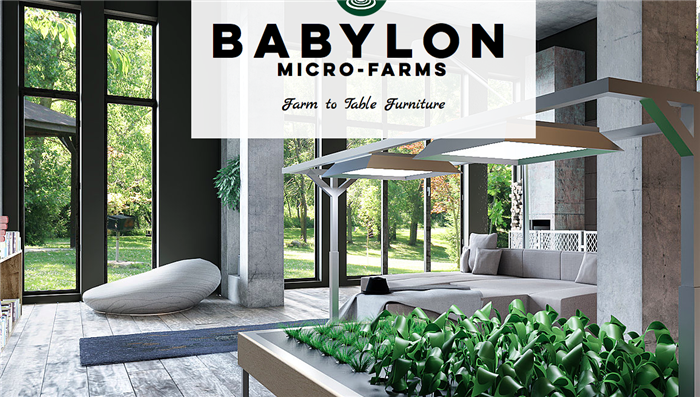Many folks think of startup life as all t-shirts and “take your dog to work” days, but Babylon Micro-farms founder Alexander Olesen takes a slightly different tack. “I guess I take a corporate approach to startups,” he tells me with a laugh during my recent conversation with the 2017 UVA grad. The UK native, who was admirably prompt for our coffee chat, espoused the many benefits he reaps from a simple but consistent routine. “These things are all fun and games for a while, but at some point, it’s got to stop,” he says matter-of-factly. The day-to-day translation of this outlook means that Olesen and his current team – Pat Mahan and Graham Smith, both engineers at UVA who have been helping Alexander since Babylon’s inception – are often the first ones in and the last ones out each day. But Olesen finds the rigidity oddly freeing – “I’m happy to work an 80 hour week…there’s nothing like finding something I really like doing, and I thoroughly enjoy doing this.”
“This” is Babylon Micro-Farms, an inventive “farm-to-table furniture” concept that brings hydroponic farming directly to a family’s living room, allowing for sustainable urban farming on a micro-scale. The hydroponic method, at its core, involves growing plants without soil, setting the roots in a nutrient-rich alternative instead. Generally, this is conducted indoors under conditions that are easier to control than Mother Nature. Olesen shares that he realized the vast potential for this idea and the “huge gap in the market” in a class on open source during the spring 2016 semester of his third year at UVA. This is where he initially learned the basics of hydroponics, and the final project was to actually build a small version and post the designs, with the goal that anyone could theoretically build it and reap the health and conservation benefits.
After doing a healthy dose of research on the market’s current hydroponic farming options, Olesen felt that there had to be a better alternative to the unsightly models he encountered, especially since they were either in the $5-$10 thousand range or, if on the cheaper side, couldn’t produce a “meaningful yield.” “I was convinced this could be easier and could be in people’s homes,” he tells me. “From the inception, this was always meant to be a business. I can’t think of a single other home appliance that grows food for you in your house.” Fair point.
Five or six prototypes later, Olesen’s vision has come a long way. The Babylon team has now developed a design sleeker than its 6 foot x 4 foot predecessor (according to Alexander, “the original idea was going to be that on a 6 foot by 4 foot area you can grow enough food to feed a family, but now it’s glaringly obvious that no one has that space”), but they’ve kept and refined some of the proprietary elements, including modular environmental controls and a product tailored to plant growth, that have set them apart from an early stage.
The notion of freedom within rigor Olesen presented when discussing his disciplined schedule is just one of many paradoxes he revealed over the course of our discussion, and when you learn more about his background, it’s easy to see how he’s cultivated an appreciation for a sort of yin-and-yang approach to life. His early childhood was spent on a bucolic farm in the UK, but then he moved to the bustling streets of Central London – he speaks fondly of both experiences, and, though he misses London, he decided to come to the States for college to seek an unconventional experience. While at UVA, his diverse interests manifested themselves in a Major in Foreign Affairs and, fittingly, a Social Entrepreneurship Minor, but he’s glad to be hitting the ground running full-time with his business – “I love learning, but I hate school,” he tells me.
Despite his strict approach to planning, Olesen has also learned the value of flexibility when it comes to the unpredictable world of startups. “The one thing I have learned for sure is that it takes 3x longer than you want it to,” he shares. After a string of successes and signs of support here in Charlottesville – the team won UVA’s Start Something Weekend pitch competition a couple years back and have received encouraging grant money – the next big step is a move to Baltimore, a city “ideally positioned to serve the East Coast” for shipping, etc. while they continue optimizing the product. Olesen sees several potential markets for his Micro-Farms, from high-end, quality indoor family gardens to affordable educational models for schools. While this may seem like a wide range on which to focus, Olesen, who thrives on diverse contrasts, seems like the perfect person for the job.

